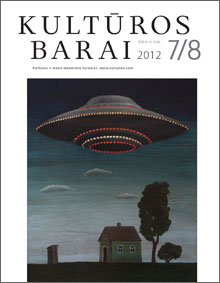 Almantas Samalavicius: I first encountered your writings a dozen or so years ago. One of the titles I ran across was Sustaining the Common Good: A Christian Perspective on Global Economy (1995). It struck me as an unusual book that offered a fresh and challenging view of global development, somewhat outside mainstream (mostly sociological) discussions of the subject at that time. In it you insisted that markets should serve communities instead of destroying them – this was the time when economist neoliberal dogma was winning out all over the world, including in post-communist eastern Europe. Today, however, these dogmas have been compromised by banking crisis and other results of the fetishization of the free-market, leading many people to look for new perspectives. What are the chances of being able to re-create the world’s markets? What’s the likelihood of overcoming the ill-famed and destructive globalized thinking of neoliberalism and the myth of the deregulated market economy?
Almantas Samalavicius: I first encountered your writings a dozen or so years ago. One of the titles I ran across was Sustaining the Common Good: A Christian Perspective on Global Economy (1995). It struck me as an unusual book that offered a fresh and challenging view of global development, somewhat outside mainstream (mostly sociological) discussions of the subject at that time. In it you insisted that markets should serve communities instead of destroying them – this was the time when economist neoliberal dogma was winning out all over the world, including in post-communist eastern Europe. Today, however, these dogmas have been compromised by banking crisis and other results of the fetishization of the free-market, leading many people to look for new perspectives. What are the chances of being able to re-create the world’s markets? What’s the likelihood of overcoming the ill-famed and destructive globalized thinking of neoliberalism and the myth of the deregulated market economy?
John Cobb: I will treat the question about what may now be possible, given the widespread distress about the consequences of our present economic and financial systems, as a double one. First, is there a chance that the professional guild of economists will give serious attention to a change of basic assumptions? Second, is there a chance that the economic and financial institutions that run the world will change or be replaced by others friendlier to human beings and the Earth?
Predicting what will happen, or trying to assess what may possibly happen, is a very risky business. The real answer is, of course, that I do not know. Certainly my past efforts to change the course of economic thinking have utterly failed to do so within the academic discipline. On the other hand, my friend and writing partner, Herman Daly, has played a significant role in the establishment and development of “ecological economics”. Although this school of thought is virtually excluded from academic departments of economics, it has gained a significant following at the fringes, such as in schools of forestry and in other communities, such as religious and environmental movements. The book I co-authored with Daly, For the Common Good, has contributed to the development of ecological economics.
When we wrote the book, the title in our minds was “economics for community”. That would express the distinctive feature of the economic thinking for which we called and continue to call. The academic discipline of economics is based on the idea of Homo economicus. This assumes and reaffirms extreme individualism. Members of the species Homo economics compete with one another for scarce resources. Policies based on this understanding of human beings typically result in the destruction of human community. Even if the result is also that there is more consumption of goods and resources per capita, the people involved are, for the most part, not happier or better off. Instead, we advocated that we understand and treat people as persons-in-community. Persons-in-community find that their individual lives improve as the quality of community improves. Competition among them plays some role, but much of it is to see who can contribute most to the life of the community as a whole. This often involves some increase in the production and consumption of goods and services; but “growth” in this limited sense is by no means the goal. Sometimes, improved distribution of products can improve the quality of community life without any such increase. If the increase of production impoverishes the environment of the community, a decrease can be better. The proper role for economists is to discern what kind of economic activity contributes most to the health of the community at the least cost to the environment. Sometimes, regenerating the natural environment can contribute more to the sustainable wellbeing of the people than maintaining even the present level of production.
Accepting this different view of human beings would require reconstructing economic theory from the ground up. Such a reconstruction has been partially discussed by economists from time to time. Much more has been done, outside the guild, among ecological economists. It is not impossible that the guild will take on this task, but there are few signs that it will do so. Academic disciplines as a whole devote themselves to the socialization of new members of the guild, rather than seeking a broader or deeper truth. The policies of most governments and international economic organizations largely follow from the individualistic economic theory of the professional academics. If the graduate departments of economics changed, there is a good chance that the policies of governments and global economic institutions would change also. But, of course, they might not. Established policies and institutions have powerful constituencies. On the other hand, the increasingly manifest problems generated by the individualistic economic theories might open nations and global institutions to take an interest in human communities and the natural environment. Indeed, some of the problems are so serious that changes in actual policies and programs might proceed even without any theoretical support from professional economists.
If we focus concern on communities, some of these communities will be nations. We will encourage nations to control their own economies so that they will serve the national community rather than only the international economic elite. The argument that “free trade”, i.e. trade controlled by corporations rather than governments, benefits all the nations that take part in it is extremely tenuous. But it is the acceptance of this argument that has created the global economy that is hurrying us all to global ecological catastrophe while destabilizing society in much of the world.
The argument is based on a principle called “comparative advantage”. In its original formulation by Ricardo, it is recognized that this comparative advantage depends on capital remaining national. In Ricardo’s example of Portugal and England, Portuguese capital remains invested in Portugal, and English capital, in England. Once capital crosses national boundaries, comparative advantage does not apply. The result is the dominance of absolute advantage, and this leaves most countries at a serious disadvantage. Obviously, this is the situation today. It is astonishing that so many nations have been talked into giving up control of their own economies by appeal to a principle that is so obviously inapplicable!
The actual experience of increasing poverty and helplessness works against being further duped. There is growing popular opposition to trade agreements that are based on the supposed advantage of “free trade”. There is some movement back to national economies and even to local ones. Perhaps theorists will someday catch up with reality. However, the corporations that benefit from “free trade” are extremely powerful. In the United States they control both the Democratic and the Republican parties. Their demand for extending “free trade” is not in fact based not on economic theory, but on the advantages they gain from it.
My prediction is that corporations, among which financial institutions now play the largest role, will continue to advance globalization until they collapse. When that collapse comes, there will be a great deal of suffering. Still, we must hope that the collapse comes before it is too late to preserve the habitability of the planet. If it does, a different economy will arise that pays more attention to human communities and the natural environment.
AS: My own understanding of economics was greatly affected when I became acquainted with the writings of E.F. Schumacher, an encounter which eventually brought me to a new territory of works by unconventional authors who challenge the dominant assumptions in contemporary economic thought. How did you – a theologian – enter the domain of economics, which in present times is still guarded by professional economists who don’t like trespassers into what they think is exclusively their own disciplinary field?
JC: After three-and-a-half years in the US Army in World War II, I went to the University of Chicago: first the Humanities Division and then the Divinity School. Like any Christian who takes modern thought seriously, I found a disconnect between my faith and modernity. My encounter with the philosophy of Alfred North Whitehead enabled me to comprehend both the natural sciences and belief in God in a coherent vision. This meant that, for me, theology was never separate from other aspects of thought, as some theologians in the modern world have thought.
On the other hand, my interests in this regard were largely theoretical. The synthesis made possible for me by Whitehead’s philosophy was of science and theistic faith. At that point I had little interest in economic theory. However, my understanding of faith involved me directly in issues of economic justice. I was a child of the “social gospel” that developed towards the end of the nineteenth century among Protestant preachers in response to the exploitation of workers in the early days of industrialization. Those awakened to the importance of economic systems dealt with a wide range of practical issues; concern for peace and justice was central to my childhood faith. This way of understanding Christian life and thought was undergirded by biblical studies that lifted up the tradition of Hebrew prophesy and saw Jesus’ proclamation of the Kingdom of God as the capstone of this tradition. To follow Jesus was to work for the coming of the Kingdom, which was understood partly in terms of economic justice and peace among nations.
I was awakened to the threat of environmental catastrophe in 1969. Philosophically and theologically I was never a Kantian, and I had long affirmed the reality of the natural world, its importance to human beings, and its value in and for itself and to God. But this had not led me to the sort of study that would have made me aware of the enormous damage human beings were inflicting upon it. Hence, although the message that we were all at risk profoundly shocked me, it was immediately understandable and believable. I already understood human beings as part of the natural world, so that damage to that world was damage to all its inhabitants. Indeed, I was shocked that, given my metaphysical convictions, my own theological work had been so anthropocentric. Both the Bible and Whitehead were concerned with the whole of nature, but I had supposed that nonhuman nature would take care of itself!
Once I was awakened, I set out to write theologically in a different way. In 1970 I wrote Is It Too Late? A Theology of Ecology, which Environmental Ethics still keeps in print. I considered my first responsibility to be to help overcome the anthropocentrism of Christian theology in general and especially of the liberal Protestant tradition that followed Kant. But I also realized that, if the world was to be saved, changing theology could contribute only a little. The world’s leaders pay very little attention to Christian theology. Their “theology” is taught in the modern research universities, and especially in departments of economics.
In 1972 I co-organized a conference on “Alternatives to Catastrophe”. We wanted to bring together thinkers who took the threat to the Earth seriously and also proposed changes that might ward it off. The two speakers who most fully embodied what we sought were Paolo Soleri and Herman Daly. Daly was writing about shifting from a “growth economy” to a “steady-state economy”. I was convinced of the correctness of his judgments, and he led me to see that the issues were not just practical but deeply theoretical. From that time on I have considered economic theory to be a secular “theology” that is the greatest threat both to Christian faith and to the planet.
AS: Do Christians or people who link themselves to the tradition of Christianity tend to see in their religion the basis for a critique of the foundations of the prevailing economic regime? Or is the Christian faith perceived to be extraneous to the sphere of economics? What are the possibilities of bridging Christian and economic thought?
JC: I am not optimistic that many theologians will take on the task that seems so important to me – the detailed engagement with the assumptions and theories that underlie various academic disciplines and, because of its practical importance, especially economics. However, that economics is important is widely recognized among theologians and other Christian leaders. Especially in global Christian organizations, economic issues are intensively discussed. The World Council of Churches has had many studies and conferences dealing with economic issues. In my view, the best statement to date is the Accra Declaration of the World Alliance of Reformed Churches – 2004, “Covenanting for Justice in the Economy of the Earth”. This statement declared: “We believe the integrity of our faith is at stake if we remain silent or refuse to act in the face of the current system of neoliberal globalization.” The implications of this statement are richly unpacked.
Still, I have to acknowledge that Protestant denominations in the United States pay very little attention to the pronouncements of international bodies, even if they belong to them. Local pastors do not want to introduce such statements to their congregations, even if they personally agree. Whereas during the Thirties, American denominations were prepared to discuss all sorts of issues of this kind, since World War II they have largely accepted the role of relating seriously only to certain aspects of life and thought. They have given a hundred times more attention to matters of sexuality than to the survival of humanity. Their members would not be prepared to understand the attack on neoliberalism as an expression of faith. Obviously I deplore this narrowing of the understanding of the Gospel.
AS: The notion of the “common good” is vague all over eastern Europe – the region that chased the free market economy as a kind of salvation after half-century of the culture of scarcity. Participating in number of discussions on the future of higher education in my country, I was shocked to learn what a limited understanding of common good exists among academics, who are supposed to be gatekeepers to the territory of knowledge and ideas. How do you interpret the common good and its relevance for contemporary society?
JC: The term “the common good” has played its largest role in Roman Catholic ethics. This means that Catholics might well claim a special right to define it. It was not part of my own vocabulary. Accordingly, I can claim no credit for our book having given it some fresh attention in the USA. We wrote the book with the title “economics for community” in mind. But our publisher proposed “The Common Good” instead, and we accepted.
The idea of the common good depends on an understanding of community. If we approach matters individualistically, as standard economic theory does, then the good of a group of people is simply the addition of the good of individuals. But we believe that each persona is largely constituted by her or his relations with other members of their social group, and by the way the group as a whole is structured and relates to other societies. Individuals are much better off if some of the societies to which they inevitably belong are communities in which all feel some responsibility for all. The good of the community involves a pattern of relationships among its members and a concern on their part for how the community as a whole is doing. The wellbeing of the community directly improves the wellbeing of its members.
Much of one’s identity comes from the communities of which one is a part. I am a member of the Christian community. I am also an American. And I am a citizen of Claremont, California. My feeling about myself is affected by my sense of pride or embarrassment with respect to these communities. A criticism of American imperialism is felt my many Americans as an attack upon them personally. They are likely to feel good about themselves when the United States has been successful in some venture. None of this reality is well understood by those who think individualistically. Once we do understand how important our communities are to our very identity, we can distinguish the common good from our individual goods. We can then say that economics should serve the common good.
AS: One of your books, entitled The Earthist Challenge to Economism, was subtitled as a “Theological critique of the World Bank”. Could you summarize this critique?
JC: Of the Bretton Woods Institutions, the World Bank was the one that was conceived as dealing most directly with human needs. It was intended to provide advice and economic assistance to underdeveloped countries. It attracted many idealistic people who believed that overcoming the extreme poverty of many countries was of great importance for their people and for the world. I had deep appreciation for the idealism that went into its founding and characterized many of those who worked there.
On the other hand, as I learned more and more about its methods, I was deeply troubled. For example, the World Bank was partial to large development projects such as dams. Obviously, these solved various problems and generated power and provided water for irrigation. But many of these dams also did great ecological damage, wiped out numerous communities, and destroyed the economic base of many others. Ecologically they did much more harm than good.
What I found was that the World Bank paid some attention to the whole range of consequences of its actions, but gave primary attention to their effects as measured by standard economic, and therefore individualistic, theories. Indeed, the dominance of economists within the World Bank made other evaluations largely irrelevant.
Worse still, in my view, was a shift to supporting corporate investment. The World Bank originally made loans to countries to engage in the development programs. However, during the Reagan administration there was a shift in thinking about development. Instead of governments and international organizations making gifts and loans, the focus was on making countries attractive to investment by corporations. Once that shift had been made, the World Bank joined with the International Monetary Fund and the World Trade Organization in promoting “free trade” and economic globalization. Whereas, earlier, the World Bank would work with governments to decide on development projects that would improve the national economy, now it worked with national governments to persuade them to abandon the effort to control their own national economies. Their task was to make themselves attractive to foreign investors; that speeded the “race to the bottom” in environmental and labour standards, among others. Indeed, many nations became unable to educate their own people and care for their health.
The assumption, of course, is that human community has no value. The only goal is the increase of the average “standard of living” as measured by quantity of consumption. In this calculation, even the distribution of consumption plays no role. The emergence of a few billionaires counts for as much as the rise to a living wage on the part of millions of workers. From my perspective, the World Bank had become part of the problem rather than its solution – although it still had many excellent programs. It had joined the worship of economic growth. This religion introduces the destruction of human community, and thus of human wellbeing, as well as the degradation of the natural environment.
AS: What recent works in the field of economy you consider essential reading for our understanding how present economy works and how it should or could work?
JC: There have always been economists who cared about the distribution of income as well as its quantity, and this topic may gain more traction. There are certainly now prestigious economists who recognize the limitation of evaluating everything in terms of per capita GDP. One can now imagine larger efforts to develop better indices that would have behind them the prestige of accepted economists. And certainly, more economists now pay attention to the costs of environmental destruction. This is progress. But I have not seen any discussion in the professional guild of the need for fundamental reconstruction of the discipline on the basis of a different understanding of human beings and of the natural world.
At the moment, the two books I would recommend most heartily are Mark Anielski’s The Economics of Happiness and Herman E. Daly’s and Joshua Farley’s Ecological Economics: Principles and Applications. The latter is written as a text; if courses on ecological economics were regularly taught in universities using this text, change could be rapid.
In addition, I think that students of economics are not being taught the extent to which finance now dominates national and global economy. One book that I recommend on this topic is Lawrence E. Mitchell’s The Speculative Economy: How Finance Triumphed Over Industry. When the primacy of finance is understood, the student is ready to see the extreme importance of money creation. The most comprehensive book on this topic is Stephen Zarlenga’s The Lost Science of Money: The Mythology of Money – The Story of Power. However, the basic idea is more accessible, at least for Americans, in Ellen H. Brown’s The Web of Debt: The Shocking Truth about Our Money System and How We Can Break Free. Finally, for an excellent view of how economies can be, and often are, manipulated for the sake of corporations and especially financial ones, I recommend Naomi Klein’s The Shock Doctrine: The Rise of Disaster Capitalism. If these books were digested by economics majors, the change in economic thinking would be fast and dramatic.
AS: You have written about both Buddhism and Christianity. What can the legacy of both religions teach the present economic theory? As we know, Schumacher offered an interesting perspective on Buddhist economics, at the same time emphasizing that all great religious traditions can offer their own wisdom to economics. Can we in the secular West make use of Buddhist thinking and ethics?
JC: None of the great wisdom traditions of humanity support the ideology on which modern economics is based. All insist that there are higher values than the acquisition of goods and services. This makes the relatively mild opposition to the new global religion of selfishness and consumption deeply disappointing. The failure, I think, is due to religions’ loss of confidence after the centuries-long retreat before the advance of science. Economics claims to be a science, and the wisdom traditions have no taste for battling science. The work of Alfred North Whitehead has liberated some of us from this uncritical reverence for what we encounter under the heading of “science”.
Buddhism has the most sustained and developed critique of substance thought and the individualism it usually induces. It also is most consistently and systematically opposed to attachment to worldly goods. Accordingly, one would hope for profound resistance to the now dominant world religion from Buddhist countries. Indeed, we can celebrate the fact that one Buddhist country, Bhutan, has explicitly replaced the goal of increasing “gross domestic product” with the goal of increasing “gross domestic happiness”. Regrettably, this is a striking exception among the Buddhist countries. Elsewhere, however, one finds important Buddhist movements against domination by modern economic teaching which are not matched by similar movements in the Abrahamic traditions. Most important are the work of Sri Ariyaratne in Sri Lanka and Sulak Sivaraksa in Thailand.
When Chinese leadership in the early twentieth century recognized that the colonial powers were nibbling away at its territory and its sovereignty, they decided that China could be an independent and great power only by adopting the western Enlightenment. This, of course, included western economic teaching and practice. This required suppression of their distinctive ancient wisdom embodied in Taoism and Confucianism. They have been brilliantly successful in restoring China to a major player on the world stage. But the Chinese leadership now recognizes the harm done by this move, socially, culturally and existentially. It is re-opening itself to its own traditional values and wisdom. It would be too much to claim that thus far it has generated serious economic ideas out of those traditions. But they now function as checks in some respects.
While the dominant school of economic thinking in the West promoted capitalism, many Christian thinkers adopted socialism as more expressive of Christian understanding and values. Because, in Europe, “socialism” is associated with a mixed economy and democratic government, many European Christians continue to criticize capitalism and neoliberal economic theory from a socialist perspective. In England, the socialist movement is closely related to the labour movement, whose early leaders came largely from the Wesleyan movement. In Japan, Toyohiko Kagawa, Japan’s most famous Christian, founded the labour movement and the socialist party.
In the United States, the socialist party was closely related to the leftwing of the Protestant churches. Over many years, its candidate for president was a Protestant minister, Norman Thomas. However, those who controlled the media so identified “socialism” in the American mind with “communism”, and “communism” with the Russian Bolsheviks, that “socialism” has largely disappeared from the Christian vocabulary. Protestants have thus left economic theory to the “experts”, that is, to the professors of economics in graduate schools.
Roman Catholics, for good and ill, have never allowed themselves to be crowded out of the public sphere. In the nineteenth century they actually developed their own economic theory, based on the importance of community, as a third way between capitalism and socialism. The solidarity movement in Poland adopted this theory. But it is totally marginal in the United States, barely taught even in Catholic universities.
AS: The climate of recent decades were full of ambiguities and controversies, fuelled by general tendency towards relativism and pluralism in the humanities and social sciences. What standards and norms are especially relevant to contemporary society (both from a Christian and non-Christian perspective), in view of ecological problems, the disillusionment with constant economic growth, the failure of industrial technologies, the new threats brought by genetic engineering, and the like?
JC: There is a deep irony, perhaps tragedy, that at a time in history when the problems that we face have a truly penultimate character, the most advanced intellectual culture is absorbed in a relativism that discourages conviction and commitment. Whereas advanced intellectual culture is sometimes ineffective in the popular context, in this case there is all too much continuity.
I myself have emphasized pluralism in many ways. From a Whiteheadian point of view, no two entities ever operate out of exactly the same world, and these differences are magnified among humans. When we deal with products of diverse religions and cultures and historical epochs, the differences are great indeed. It is very important that I do not rank different perceptions and resulting beliefs as better and worse according to their similarity to mine.
Regrettably, in my view, this pluralism is often associated with the rejection of “truth”, at least if that is a matter of correspondence. We are forced by accurate analysis to recognize that no verbal statement can “correspond” with the “way things are”. At best we can only argue that some lead to more successful actions than others or cohere better with one another. But then we can also recognize that judgments of what works best are also relative and that rational coherence often closes us to the evidence. All of this is combined with scepticism about the claims of “science” and the honesty of scientists. Some of the latter are in the pay of corporations and speak as they are paid to do. The net result is that many of our best minds celebrate lack of conviction and commitment in a world where existing patterns of behaviour will rapidly lead us to exterminate ourselves. Those who have strong convictions and act on them are viewed somewhat condescendingly or as a threat to peaceful co-existence of people.
Religions are often understood to be responses to “the ultimate”. Some regard the ultimate as impersonal, some, as personal. Of course, there have been many disputes about this. Relativistic pluralists are likely to say God is a mystery, so that nothing that is said about God is either true or false. Whitehead made a different judgment. He thought there is an ultimate that is actual only in its instantiations. In the West, this is often called Being Itself. In Hinduism, it is Nirguna Brahman. In Buddhism, it is Dharmakaya. In China it is the Tao without attributes. In physics we might name it “energy as such”. But in Whitehead’s view, this ultimate never functions in the world apart from an actuality through which it acquires a definite character. This corresponds, at least in a general way, with Saguna Brahman, the Sambhogakaya, the Tao with attributes, and physical laws such as the conservation of energy. This is also “ultimate” in the sense that, apart from this, there is in fact no attributeless ultimate, but equally that without this attributeless ultimate there are no ultimate attributes. These “ultimates” require each other.
This multiplicity of ultimates, one impersonal, the other in some sense “personal”, is offensive to many in the Abrahamic traditions. But one can find the distinction there as well. There is, on the one hand, “Godhead” and on the other “God”. Reflections on the Trinity also sometimes multiply the “ultimate”. Once one acknowledges that there is more than one ultimate, one can understand that different religious communities order their lives around different features of reality. Since the features around which they order themselves are both ultimate, any ranking is arbitrary.
Whitehead also enriches the picture by pointing out that neither the impersonal reality nor the personal one can have any reality apart from the world. The religious traditions that orient themselves to the world, often dismissed as “primitive”, are just as valid as the others, and may today be of special importance. Of course, this would be misleading if we supposed that there is no combining these orientations or blurring of the boundaries. The point is that pluralism frees us to accept the truth of other wisdom traditions without abandoning the truth of our own. It would also be dangerous if we assumed that all religious communities can be understood with this typology in mind. Reality is far too complex to be finally reduced to any simple conceptuality. But the recognition of the limitations of human thought is, for this kind of pluralism, an invitation to seek further – not to abandon thought.

 Almantas Samalavicius: I first encountered your writings a dozen or so years ago. One of the titles I ran across was Sustaining the Common Good: A Christian Perspective on Global Economy (1995). It struck me as an unusual book that offered a fresh and challenging view of global development, somewhat outside mainstream (mostly sociological) discussions of the subject at that time. In it you insisted that markets should serve communities instead of destroying them – this was the time when economist neoliberal dogma was winning out all over the world, including in post-communist eastern Europe. Today, however, these dogmas have been compromised by banking crisis and other results of the fetishization of the free-market, leading many people to look for new perspectives. What are the chances of being able to re-create the world’s markets? What’s the likelihood of overcoming the ill-famed and destructive globalized thinking of neoliberalism and the myth of the deregulated market economy?
Almantas Samalavicius: I first encountered your writings a dozen or so years ago. One of the titles I ran across was Sustaining the Common Good: A Christian Perspective on Global Economy (1995). It struck me as an unusual book that offered a fresh and challenging view of global development, somewhat outside mainstream (mostly sociological) discussions of the subject at that time. In it you insisted that markets should serve communities instead of destroying them – this was the time when economist neoliberal dogma was winning out all over the world, including in post-communist eastern Europe. Today, however, these dogmas have been compromised by banking crisis and other results of the fetishization of the free-market, leading many people to look for new perspectives. What are the chances of being able to re-create the world’s markets? What’s the likelihood of overcoming the ill-famed and destructive globalized thinking of neoliberalism and the myth of the deregulated market economy?




